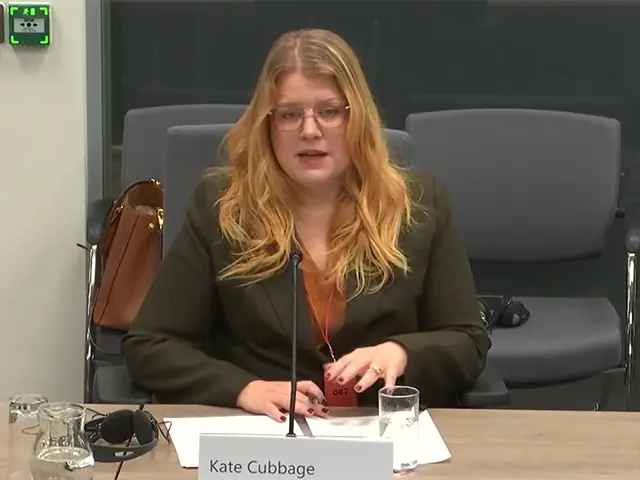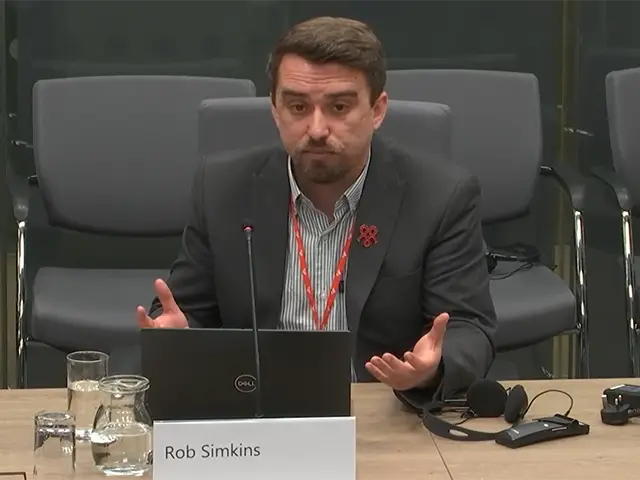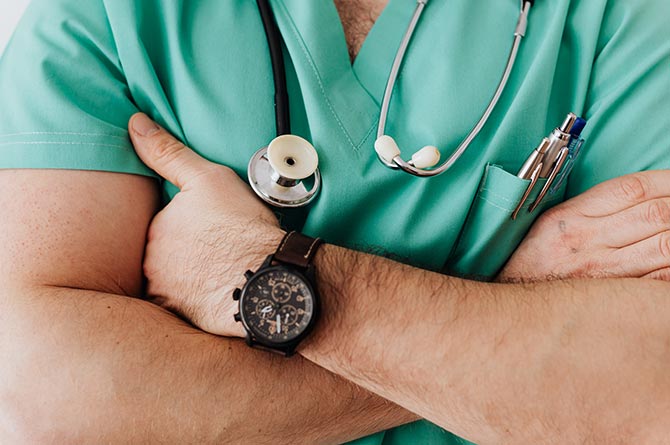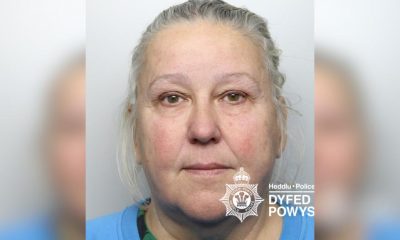Health
Leaflet to calm fears over A&E downgrade

Health board will explain how to get urgent care for children, as local NHS continues to be under extreme pressure
RESIDENTS in Pembrokeshire are being asked to look out for a leaflet about children’s hospital services, which will be delivered to households from next week (Week commencing 25 October 2021).
The leaflet will explain why temporary changes to re-locate the children’s daytime unit (PACU/Puffin Ward) and its specialist staff from Withybush Hospital, Haverfordwest, to Glangwili Hospital, Carmarthen, have been extended into 2022. It will also provide information on how to access the right care for a child when they are unwell.
Medical Director and Deputy Chief Executive of Hywel Dda University Health Board Dr Philip Kloer said: “We hope the leaflet will be a useful, quick guide for parents and carers to keep handy in the home. We know that making decisions when a child is sick or injured can be stressful and we hope this guide will help.
“It includes a QR code which will take you to our dedicated web resource on children’s services, where there are also alternative versions of the leaflet and contact details for people who wish to share their experience of care.”
The temporary move of the service was made in spring 2020 due to the need for space within the hospital to respond to the COVID-19 pandemic. It has been extended due to the continuation of the pandemic and also to ensure that the increasing number of children with respiratory illnesses access specialist care when needed.
It means that Withybush Hospital currently treats only children with minor injuries such as minor wounds, minor burns or scalds, insect bites, potential broken bones if not badly misshaped, minor head or face injuries, or foreign bodies in the nose or ear; and booked outpatient appointments.
Children with serious illnesses or injuries are treated at Glangwili Hospital where there is a co-located Emergency Department and children’s hospital services, including an overnight children’s ward, children’s high dependency unit and children’s daytime (ambulatory) care.
Multi-professional clinicians, including local senior doctors in children’s care (paediatrics), emergency medicine, and anaesthetics, have supported the recommendation and the need for clearer messaging to the public in order to reduce the risk of delays in the treatment of children and young people.
Clinical Director for Women & Children’s services, Dr Prem Kumar Pitchaikani said: “We need to avoid the delay that may be caused when a child is brought to Withybush Emergency Department only to need a transfer to Glangwili Hospital. The continuation of this temporary service change, will ensure that very ill children, including the increasing number of children likely to have respiratory viruses this winter, will get access to their definitive treatment more quickly. They can also be monitored and treated quickly by specialists in the event that they deteriorate.”
Clinical Director for Emergency Medicine, and senior consultant at Withybush Hospital Emergency and Urgent Care Centre Dr Nicola Drake said: “It is critically important that sick children have the support of specialist paediatricians at the earliest opportunity. They also need early access to specialised equipment that is provided and monitored by paediatricians.”
The intention is to continue with the temporary position and commence a review in March 2022, with a report back to the Health Board in autumn 2022. The review will be scrutinised by the Health Board and Hywel Dda Community Heath Council and will include measuring outcomes for children and young people, as well as patient experiences and the views of communities.
More information on how and when the access children’s healthcare services locally is available on our website if you search ‘children’s services’.
If you have an experience of children’s services you wish to share with us, please search the website for ‘patient survey’ or ‘complaints’; email: [email protected]; or telephone: 0300 0200 159.
We will engage with our communities about the future of children’s services in 2022, but if you want to share your views at this point please; email: [email protected]; write to: FREEPOST HYWEL DDA HEALTH BOARD (you will not need a stamp); call: 01554 899 056 (this telephone number is not staffed, but messages will be recorded).
*Please note these changes affect children’s services at Withybush Hospital only and adult services at the hospital remain the same. Paediatric services at Bronglais Hospital, Aberystwyth, remain the same. There is no change to Prince Philip Hospital, Llanelli.
- Where to get help if my child is unwell?
Call 999 if your child has serious injuries or a life-threatening illness, including severe difficulty or irregular breathing, blueness around the lips, is pale, mottled and abnormally cold, has a fit or seizure, is extremely distressed, is very lethargic or unresponsive, develops a rash that does not disappear with pressure, or has testicular pain.
Go to a Minor Injury Unit (24/7 at Withybush Hospital; weekdays, daytime only and for children over 12-months at Tenby Hospital and Cardigan Integrated Care Centre) if your child has minor wounds, minor burns or scalds, insect bites, potential broken bones if not badly misshaped, minor head or face injuries, or foreign bodies in the nose or ear.
Contact your GP today if your child has an illness that won’t go away, indicated for example by a high temperature, shivering, muscle pain, cough, wheezing, increased effort to breath, persistent vomiting/diarrhoea/severe tummy pain, blood in their poo or wee, or dehydration. Call NHS 111 Wales (24/7) for urgent advice if you are unsure what to do. Call 111 for urgent help when your usual GP surgery, or other primary care service, is closed.
*You may be asked to take your child to Glangwili Hospital Emergency Department if input from specialist children’s doctors is required.
Treat at home or contact your pharmacist if your child has a minor illness or ailment such as a sore throat, cough, skin irritation, or if a young person needs emergency contraception. You can get help online by searching ‘NHS 111 Wales symptom checker’. Some pharmacies offer treatment without appointment for low level injuries.
If you are deaf or speech-impaired you can access 999 services using the Relay UK app and dialling 999, or NHS 111 by dialling 18001 111.
Community
‘Harrowing’ distress now the norm for unpaid carers in Wales

“HARROWING” levels of distress have become the norm for unpaid carers in Wales, a committee has heard, with charities warning of a support system “set up to fail”.
Kate Cubbage, director of Carers Trust Wales, told the Senedd’s health scrutiny committee: “There are too many carers who are reaching crisis point without any support.”
Ms Cubbage explained that most councils are supporting fewer than 500 carers, warning: “There are really, really high levels of unmet need within our communities.”
She told Senedd Members that staff are receiving trauma training to support their mental health due to the levels of distress they are seeing among carers.
Ms Cubbage pointed to a University of Birmingham study which found an increased suicide risk among unpaid carers akin to that of veterans who have seen active service.
“One in eight carers has made a plan to end their own life,” she said, calling for carers to be specifically considered in the Welsh Government’s suicide prevention strategy.
“One in ten has made an attempt… at a time when the average local authority has support plans for less than 0.5% of the caring population.”
Warning of deepening poverty in Wales, the witness expressed concerns about a 31% poverty rate among carers – “far higher” than the 22% in the wider population.
Ms Cubbage added that young carers miss more than six full school weeks each year, compared with pupils without caring responsibilities who miss nearer two weeks.

She told the health committee: “It’s no wonder young carers are achieving less at school. They are less likely to go on into further and higher education.
“And if they do make it to university, they’re less likely than their peers to actually graduate.”
Reflecting on a personal note, Ms Cubbage, a parent carer, said her autistic son has accessed services from ophthalmology to audiology over the past 16 years.
“I have never once been signposted to anything that would suggest that I am an unpaid carer or that I can access support… That kind of lived experience is really important.”
Rob Simkins, head of policy at Carers Wales, added: “Things are getting worse: anecdotally, we see that through our services but also that’s what the research tells us.”

He pointed to a Carers Wales survey which has shown a “shocking” 53% increase in the number of carers cutting back on food and heating.
Giving evidence on Wednesday December 17, Mr Simkins warned of a 39% increase in the number of carers reporting “bad” or “very bad” mental health since 2023.
“All the evidence that we’re collecting shows that this is going in one direction,” he told the committee, adding: “And that’s the wrong direction. It’s a bleak context.”
Mr Simkins said census data shows about 310,000 unpaid carers in Wales but research indicates the number could be nearer 500,000 – roughly 15% of the population.
He cautioned that charities across the country, including Carers Wales, are seeing real-terms cuts in funding from the Welsh Government every single year.
Mr Simkins warned of a “shocking” lack of data and a system “set up to fail” more than a decade on from the then-Assembly passing the Social Services and Wellbeing (Wales) Act.
Warning some councils cannot quantify how many carers’ assessments they could carry out over 12 months, he asked: “How on earth are you meant to collect data from unpaid carers and plan services if you can’t even figure out how many you can assess?”
Asked about carers’ assessments, he highlighted a lack of capacity within councils as he warned a “pitifully low number of carers go on to get any support at all”.
Greg Thomas, chief executive of Neath Port Talbot Carers Centre, told Senedd Members the voluntary sector is being increasingly asked to plug gaps without necessary funding.
He warned the jam is having to be spread “ever-more thinly”, creating a tension between reaching as many people as possible and not wanting to compromise quality of support.
“We’re not quite saying ‘no’ to people,” he said. “But we’re having to say a qualified ‘yes’ about what we’re able to offer… We’re massively overstretched, massively oversubscribed.”
Mr Thomas told the committee the carers’ centre has the required reach and expertise, concluding: “It’s almost give us the tools and we can do the job.”
If you have been affected by anything in this story, the Samaritans can be contacted for free, 24/7, on 116 123, or by email at [email protected].
Health
Nearly 2,000 residents help shape future of health services across west Wales

Public feedback to inform Hywel Dda’s long-term strategy for healthcare delivery
NEARLY 2,000 people across Carmarthenshire, Ceredigion and Pembrokeshire have shared their views on what matters most for living a healthy life, as part of a major public engagement exercise by Hywel Dda University Health Board.
Over a nine-week period, residents were invited to respond to eleven key questions exploring how people stay well, how they access healthcare, and what improvements they would like to see in services, buildings and digital provision. The questions were shaped around feedback gathered from community members earlier in the summer.
The engagement focused on four main themes: a social model for health and wellbeing, digital healthcare support, balancing hospital care with community-based services, and priorities for clinical services and hospital redevelopment.
The feedback will be shared in January and used to inform a refreshed long-term strategy for the Health Board, setting out how safe, sustainable and accessible services will be delivered over the next fifteen years. While the strategy will be updated to reflect changes in clinical practice, technology and how people use health services, the Health Board says its overall ambitions remain unchanged from those set out in the original Healthier Mid and West Wales strategy in 2018.
Lee Davies, Executive Director of Strategy and Planning at Hywel Dda, said the process was about refinement rather than a change in direction.
He said: “Thank you to everyone who has taken the time to share their views. The direction of travel remains as per our 2018 strategy, so we want to reassure people that this is not a radical change of direction but rather a refinement in how we deliver the strategy. Your feedback is helping us reshape our strategy so that it continues to reflect the priorities of the people we serve, and the changes in clinical practice.”
During the engagement, many respondents highlighted the importance of strong communities, with families, friends and local support networks seen as key to helping people stay well and connected. Timely access to GP services was also raised as a priority, alongside concerns about travel to appointments, particularly in rural areas where public transport options can be limited.
Digital healthcare was another recurring theme, with people calling for online services to be simple, inclusive and accessible, while recognising that not everyone has access to technology or the same digital skills.
At its public Board meeting in November, Hywel Dda University Health Board considered progress on refreshing the strategy and received updates on the development of a new Primary and Community Care Strategic Plan. That plan, which has been shaped through further public engagement including in-person and online events and an online questionnaire, is due to be presented to the Board in January 2026.
The Primary and Community Care plan will set the overall direction for services delivered outside hospital settings and support locally-led plans for how care is provided in individual communities.
The Board also discussed a request from the Welsh Government for an addendum to the Health Board’s 2022 Programme Business Case. This will explore additional options for improving healthcare estates, including whether new facilities could help address existing infrastructure problems. It will also consider how local plans align with the national strategy, A Healthier Wales, which aims to shift more care into community settings and closer to people’s homes.
A draft version of the refreshed strategy is expected to be presented to the Board in January 2026 for approval. Once agreed, it will be published in accessible formats, with the Health Board saying communities will continue to be involved as plans move forward.
Further information about the engagement process and updates on the strategy are available through the Health Board’s public consultation platform.
Health
Resident doctors in Wales vote to accept new contract

RESIDENT doctors across Wales have voted to accept a new contract, with 83% of those who took part in a referendum backing the agreement, according to BMA Cymru Wales.
The contract includes a four per cent additional investment in the resident doctor workforce and introduces a range of reforms aimed at improving training conditions, wellbeing and long-term workforce sustainability within NHS Wales. The BMA says the deal also supports progress towards pay restoration, which remains a central issue for doctors.
Key changes include new safeguards to limit the most fatiguing working patterns, measures intended to address medical unemployment and career progression concerns, and reforms to study budgets and study leave to improve access to training opportunities.
Negotiations between the BMA’s Welsh Resident Doctors Committee, NHS Wales Employers and the Welsh Government concluded earlier this year. Following a consultation period, a referendum of resident doctors and final-year medical students in Wales was held, resulting in a clear majority in favour of the proposals.
Welsh Resident Doctors Committee chair Dr Oba Babs Osibodu said the agreement marked a significant step forward for doctors working in Wales.
He said: “We’re proud to have negotiated this contract, which offers our colleagues and the future generation of doctors safer terms of service, fairer pay, and better prospects so that they can grow and develop their careers in Wales.
“This contract will help to retain the doctors already in training, and also attract more doctors to work in Wales, where they can offer their expertise and benefit patients.”
Dr Osibodu added that the BMA remains committed to achieving full pay restoration and acknowledged that challenges remain for some doctors.
“Whilst this contract sets the foundations for a brighter future for resident doctors in Wales, we recognise that there are still doctors who are struggling to develop their careers and secure permanent work,” he said. “We need to work with the Welsh Government and NHS employers to address training bottlenecks and underemployment.”
The Welsh Government has previously said it recognises the pressures facing resident doctors and the importance of improving recruitment and retention across NHS Wales, while also highlighting the need to balance pay agreements with wider NHS funding pressures and patient demand.
The new contract is expected to be phased in from August 2026. It will initially apply to doctors in foundation programmes, those in specialty training with unbanded rotas, and new starters, before being rolled out to all resident doctors across Wales.
-

 Crime3 days ago
Crime3 days agoMilford Haven man jailed after drunken attack on partner and police officers
-

 News6 days ago
News6 days agoDyfed-Powys Police launch major investigation after triple fatal crash
-

 Crime3 days ago
Crime3 days agoTeenager charged following rape allegation at Saundersfoot nightclub
-

 Crime4 days ago
Crime4 days agoMan charged with months of coercive control and assaults
-

 Crime5 days ago
Crime5 days agoMan sent to Crown Court over historic indecent assault allegations
-

 Crime7 days ago
Crime7 days agoMan spared jail after baseball bat incident in Milford Haven
-

 Crime5 days ago
Crime5 days agoMilford Haven man admits multiple offences after A477 incident
-

 Crime4 days ago
Crime4 days agoWoman ‘terrified in own home’ after ex breaches court order



























